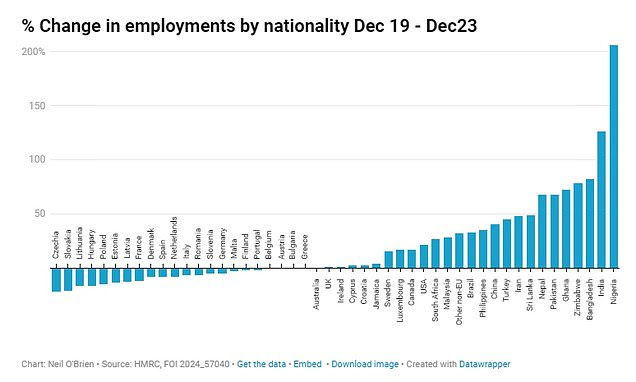Recent statistics from His Majesty’s Revenue and Customs (HMRC) reveal that between 2019 and 2023, Nigerians and Indians have emerged as the primary drivers of employment growth in the United Kingdom.
This surge contrasts sharply with the declining employment rates among European Union (EU) citizens, who have seen a significant decrease of about 10% during the same period.

The data, obtained through a freedom of information (FOI) request by Neil O’Brien, a former UK government minister and member of parliament, underscores the dramatic shifts in the UK’s labor market since the implementation of a new immigration system in January 2021, following Brexit.
During the period under review, non-EU nationals accounted for a remarkable 69% increase in employment, contributing 1.465 million of the 1.481 million new jobs created in the UK. By contrast, UK citizens only secured 257,000 of these new positions.
O’Brien’s analysis highlights the countries that have seen the most significant employment gains, with India leading at an increase of 488,000 jobs, followed by Nigeria with 279,000.
“Within that non-EU total, the biggest growth in employments in absolute terms were among nationals of India (+488,000), Nigeria (+279,000), Pakistan (+101,000), and Ghana (+55,000).
“There were also 175,600 more employments held by people from unspecified other non-EU countries.
“But it is pretty striking that the UK economy has created more additional employments for nationals of both India and Nigeria as single countries than for UK nationals over this period,” O’Brien wrote in the report analysis.
This shift illustrates how non-EU workers, particularly from these two nations, have become increasingly vital to the UK’s workforce.
The growth in non-EU employment has been most pronounced in the private sector, where non-EU workers gained 1.2 million jobs, compared to just 29,000 for UK citizens.
This shift in employment dynamics has also seen a decline in earnings for Indian and Nigerian nationals, who, prior to the pandemic, earned more than their British counterparts but have since seen their wages fall below that of UK citizens.
Experts suggest that non-EU migrants are increasingly filling roles that were previously occupied by EU workers before Brexit and the COVID-19 pandemic disrupted the labor market.
Ben Brindle, an economist with Oxford University’s Migration Observatory, echoed this sentiment in an interview with the Daily Mail, emphasizing the impact of these demographic changes on the UK’s workforce.
The United Kingdom has become a particularly attractive destination for Nigerian professionals, especially in the healthcare sector, where many have migrated in search of better opportunities and improved living conditions.
This trend has played a significant role in the rising number of Nigerians employed in the UK, particularly in critical sectors like healthcare.
However, in response to the influx of non-EU workers, the UK government has tightened the rules for work and student visas, aiming to manage the growing demand and maintain control over the country’s immigration policies.


